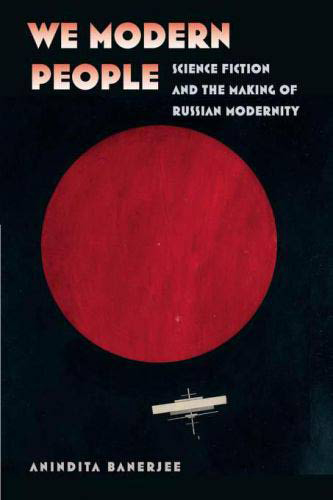Book says science fiction created modern Russia
By Linda B. Glaser

Science fiction as a genre first emerged not in the technologically advanced West, but in largely agrarian late 19th century Russia. As associate professor of comparative literature Anindita Banerjee explains in her new book, Russian writers weren’t reflecting changes happening in their everyday life, but rather visualizing what could be; science fiction became a way of not just talking about, but also of creating modernity in Russia.
In “We Modern People: Science Fiction and the Making of Russian Modernity,” Banerjee addresses the tumultuous decades between the 1890s and the 1920s. She draws parallels between Russia then and globalization today. Like Darwinism and electricity in the early 20th century, “genomics and robotics, information science and digital media have come to constitute primary indices of tremendous upheavals in our contemporary life and reality. ... The pace of science and technology is so compressed that every few minutes something is invented with world-changing potential.”
The audience for science fiction in Russia spanned every part of society, from avant-garde artists to scientists to philosophers to schoolteachers to policymakers. “Science fiction emerged at the confluence of a revolution in Russian print media and the scientific and technological revolution in the West,” Banerjee said. “These media were obsessed with techno-scientific marvels that were changing the fundamental ways of thinking and living. Science fiction quickly became the preeminent way of visualizing modernity in Russia and what was to come.”
Rather than being simply a literary representation of ideas or a compensation for the lack of real modernization in Russia, science fiction offered a forum for synthesizing interpretations and critiques of the latest developments in science and technology. Banerjee calls science fiction an “active participant” in the modernizing of Russia, contributing new terms and paradigms to the “real” world.
Banerjee uses new archival materials to analyze early Russian writers such as Yevgeny Zamyatin, whose book “We” George Orwell called the inspiration for “1984.” “Despite, or perhaps because of, the uneven manifestations of technological modernization in everyday Russian life,” writes Banerjee, “science fiction became the self-identified narrative of a new imagined community that Zamyatin called ‘we modern people.’”
Banerjee studies the literary and media cultures of Russia, Eurasia and South Asia from a comparative, interdisciplinary perspective. She is a faculty affiliate in the South Asia and Visual Studies programs and a fellow of the Atkinson Center for a Sustainable Future.
Bannerjee will read from her book, written to be accessible to lay and academic audiences, at Ithaca’s Buffalo Street Books, Feb. 10 at 3 p.m.
On Feb. 5 at 4:45 p.m., she will speak on “Petromodernity: Post-Soviet Fiction and the Biopolitics of Oil” at the Toboggan Lodge, 38 Forest Home Dr.
Linda B. Glaser is staff writer for the College of Arts and Sciences.
Media Contact
Get Cornell news delivered right to your inbox.
Subscribe